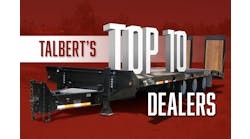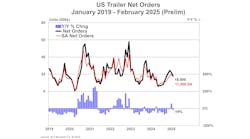Wealth advisors provide trailer dealers with tips, tricks for navigating FET, new tax laws
Only two things are certain in this trucking world – FET and taxes.
Admittedly, these certitudes are redundant, but “unnecessary” epitomizes how most trailer dealers feel about the Federal Excise Tax, especially when tasked with navigating the 100-year-old tax on truck and trailers purchases – while also attempting to interpret changes to income tax filing.
Fortunately for National Trailer Dealers Association (NTDA) members, CliftonLarsonAllen Wealth Advisors is offering its assistance.
The firm loaned two experts on tax law relating to heavy-duty truck and trailer sales, Tim Reynolds, principal, and Pat Hoppa, manager—both out of its Kansas City office—to attendees of the 28th Annual NTDA Convention where they provided updates, tips, and invaluable insight.
“What I’m going to tell you here is a compilation of things I’ve talked about or helped others with,” Reynolds said. “I’ve also handled several IRS exams, so this might give you some good information to take back, and some best practices to put in place, so you can stay out of hot water with the IRS.
“And when they do unfortunately come knocking, you’ll know how to handle it.”
Navigating FET
The dreaded federal excise tax imposed on the first retail sale of trucks and trailers debuted in 1917—helping fund World War I.
More than 100 years later, the 12% tax is adding up to $22,000 to the price of a new unit.
Thus far, the tax has resisted multiple repeal efforts, including the most recent, HR 2946, the ‘Heavy Truck, Tractor and Trailer Retail Federal Excise Tax Repeal Act of 2017,’ sponsored by Rep. Doug LaMalfa and referred to the House Committee on Ways and Means in June of last year.
But Reynolds said he’s optimistic change is coming – with the right approach.
The key he said, is to present an alternative plan offsetting lost FET revenue, and focus on simplifying the rules.
“There is a lot of good traction in the industry to get this repealed,” he said.
“(But) you just don’t go there and say ‘Hey, we want this repealed!’ and expect to hear ‘OK.’”
In the meantime, make sure those tax-exemption forms are current and easily accessible.
“When the IRS comes in, the first thing they look at is exempt sales,” he said. “‘Why are you selling something exempt?’ You have to support it, whether it be with an exemption certificate or something in the codes and regs, to say ‘Hey, here’s why I sold that guy a trailer and didn’t charge FET.’”
Obtain the forms, fill them out, completely, and make sure they are submitted and verified prior to or at the time of the sale and dated correctly, because if the IRS wants to “play hardball,” they can make a sale taxable based on the most minor oversight.
And remember, farmers—no matter what they claim—are not FET exempt.
“Do not allow your customers to dictate what’s exempt and what’s not,” Reynolds said. “If I come in and say, ‘Well, the guy down the road’s not charging me FET on this,’ well, who cares? Tell me why it’s exempt because I’m on the hook. (An auditor) is not going to go after your customer.
“He’s coming after the seller.”
Also, don’t assume parts and accessories never serve a transportation function, Reynolds said. If the equipment preserves cargo, assists in the loading and unloading of cargo, affects the safety or maintenance of a unit, or contributes to the comfort and convenience of a passenger, it’s taxable.
And don’t let Publication 510 confuse you – or lure you into false security.
“It’s a great starting point, but it can also lead you down the wrong path a lot of times on determining if something’s taxable or not,” Reynolds said.
Reynolds also warned against trying to avoid FET by invoicing items separately and assuming a clean audit in the past equates to no liability in the future.
“If they find (a problem) before you do, guess what, you’re writing a check,” he said.
Relevant reform
Hoppa reviewed key provisions from last year’s holiday-season tax reform, clunkily titled ‘HR 1—An Act to provide for reconciliation pursuant to titles II and V of the concurrent resolution on the budget for fiscal year 2018,” aka the Tax Cuts and Jobs Act (TCJA), that may apply to trailer dealers.
The goal, Hoppa said, was to simplify tax code and make the US more competitive with international businesses.
“Overall, what we’re seeing is a reduction in rates, expansion of some credits, a number of new or modified provisions, and also some tradeoffs along the way,” he said.
For C corporations, graduated tax rates with a 35% maximum were reduced to one flat 21% effective tax rate.
“That put a disparity between the individual tax rate … and new corporate rate,” Hoppa said. “So one of the areas we’ve been speaking with our clients a lot in, is this Section 199A small-business pass-through deduction.”
The pass-through applies to non-corporate taxpayers, ie partnerships, S corps and LLCs. It’s an individual-level special tax deduction that essentially is a 20% deduction against qualified pass-through income intended to reduce the rate on qualified business income to one that’s closer to a corporate rate.
Small businesses, which for tax purposes are businesses with average annual gross receipts totaling less than $25 million—up from $5 million under the old law—can use the cash method for accounting, Hoppa said, allowing inventories to be considered non-incidental materials and supplies.
In addition, small businesses are exempt from limitations on interest deductions.
TCJA also expanded on provisions that enhance the acceleration of benefits related to fixed assets to boost economic stimulus and pay for the cuts, and provided vehicles for faster recovery of depreciation deductions.
Other reforms include changes to interest expense deductions, carrying back or forward of net operating losses, and what qualifies as meal and entertainment expenses for entertaining clients.
“Entertainment, under the law as its written, is non-deductible,” Hoppa said. “(So) there are a lot of questions of, ‘What if I have meals incurred and there is an entertainment element? How do I split it?’
“The IRS (recently) issued a notice that they’re intending to issue more guidance on the entertainment aspect of this.”
Year-end tax planning
Hoppa also shared tips and ideas related to the new tax provisions to help businesses prepare for the end of the year. These highlights from Hoppa’s presentation are based on topics he’s covered with clients and may not apply to every business or situation, so speaking with a tax advisor is highly recommended.
Plan for tax losses
• May be carried back two years, with tax dollars recovered at current rates
• Carrying forward may result in dollars lost with lower rates forecasted
Time income and deductions
Look at ways to defer income and accelerate expenses.
• Review prepaid expenses and accrued liabilities – they may be deductible sooner
• Capital expenditure decisions – decide when to purchase
• Write off bad debts – how many accounts are uncollectable
Section 179 depreciation
• Ability to expense tangible property and computer software up to $1 million for 2018
• Phase out threshold increased to $2.5 million
• Eligibility expanded to include roofs, HVAC and fire alarm/security systems
• Deduction limited to taxable income – cannot use Section 179 to create losses
Bonus depreciation
• Ability to take a first-year, 100% deduction of the cost of “qualifying” property; residual basis in the first year and later years is depreciated over the otherwise allowable method/years
• Qualifying property is tangible property depreciated under MACRS with a recovery period of 20 years or less; certain interior nonresidential building improvements and leasehold improvements may qualify
• Expanded to include new and used property
• Phase down beginning in 2023 (2026 full phase out)
Capitalize vs. expense for repairs
• New regulations may allow dealerships to expense items that would normally have been capitalized
• Implementing this policy will allow expensing of items costing less than $2,500 and $5,000 in some cases
Parts inventory adjustments
• Reconcile inventory balances on books with parts inventory records
• Reconciling usually results in decreased taxable income – shrinkage
• Consider writing off obsolete inventories before year-end
IRS Scams
• Crooks are still in business, making “threatening” calls to taxpayers and using technology and tactics to entice immediate response
• Train staff! Do not open rogue e-mails or provide information to unknown sources











